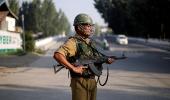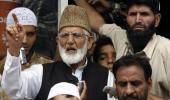As many as 504 separatist leaders, who had been detained following the abrogation of Article 370 provisions a year ago, were released after they signed bond of "good behaviour", Jammu and Kashmir Police chief Dilbag Singh said on Thursday.

Singh also said out of the 350 separatist leaders and stone pelters who had been sent to jails in other states, only 50-60 continued to remain behind bars and the rest were released.
"A total of 504 separatist leaders belonging to Hurriyat Conference and Jamaat-e-Islami and others have been released so far after they signed good behaviour bond," he said.
Those who sign "good behaviour bond" are bound to maintain peace and not indulge in any violent or separatist activities after being released from jails or home detention.
The Director General of Police said after the abrogation of Article 370 provisions on August 5, 2019, a total of 5,500 youths were detained by security forces and all of them were let off after three-four days following counselling and taking assurance from their parents that they would not indulge in any violent acts like stone pelting in future.
However, he said, cases were against 1,200 other youths for indulging in violent acts.
Singh said about 144 boys, who were under 18 years old, were also detained last year for indulging in violence and currently just 17 of them are in remand homes set up under the Juvenile Justice Act.
He said at least 16 youths, who joined the ranks of the militants, have returned after persuasion of police and family members and no action has been taken against them as they were not involved in any violence so far.
Referring to those who were sent to jails outside Jammu and Kashmir, the police chief said about 300 were released as their custody period under the Public Safety Act was over and it was felt that their further detention was not required.
"We will review the cases of other 50-60 people when their prison terms come to an end," he said.
Talking about the future strategy to deal with militancy in Jammu and Kashmir, Singh said there was a need to enhance technical surveillance along the border with Pakistan so that terrorists could not enter India and efforts should be made for de-radicalisation of the youth.
In addition, there should be programme for skill development for the youth and all development aspirations gaps should be filled, he said.











 © 2025
© 2025